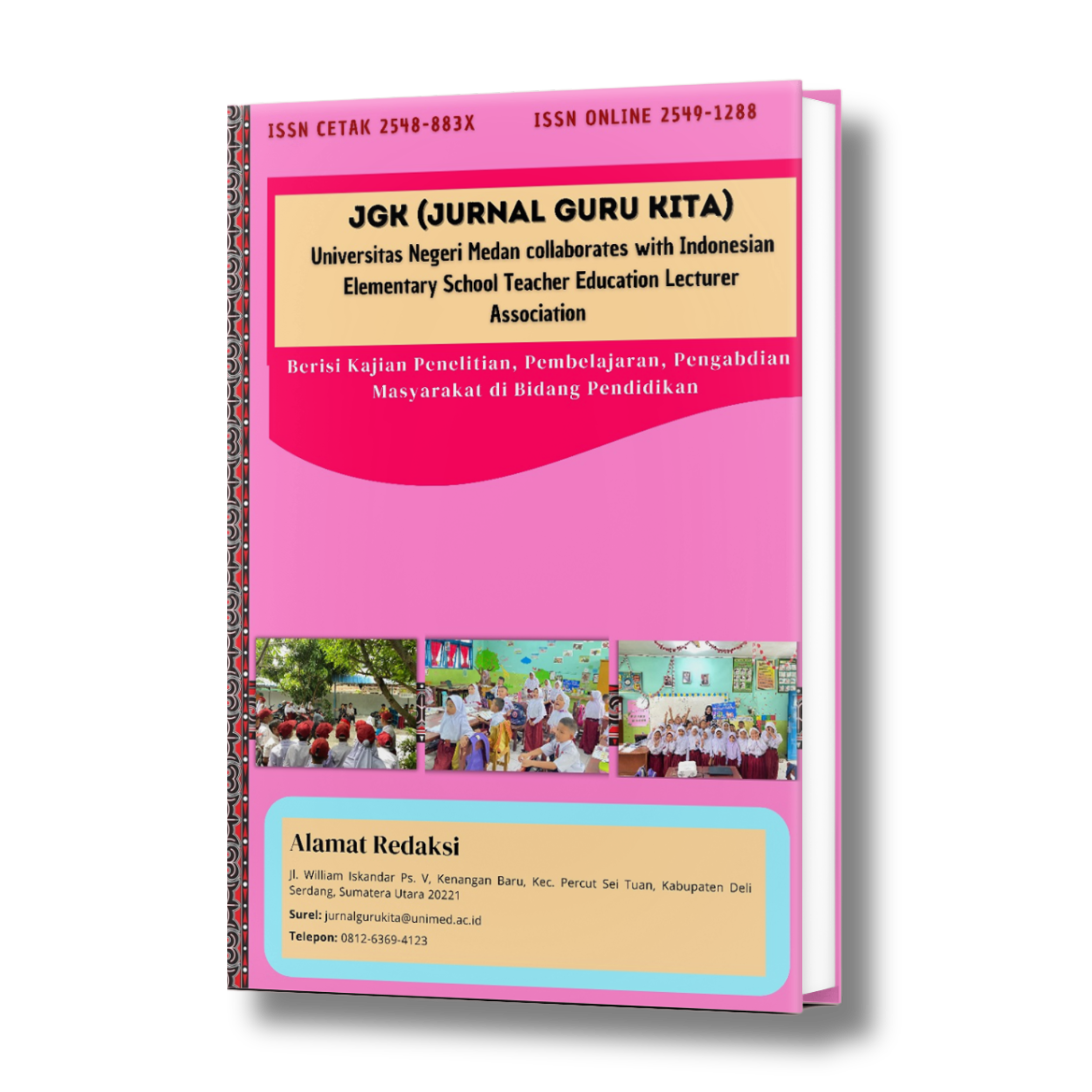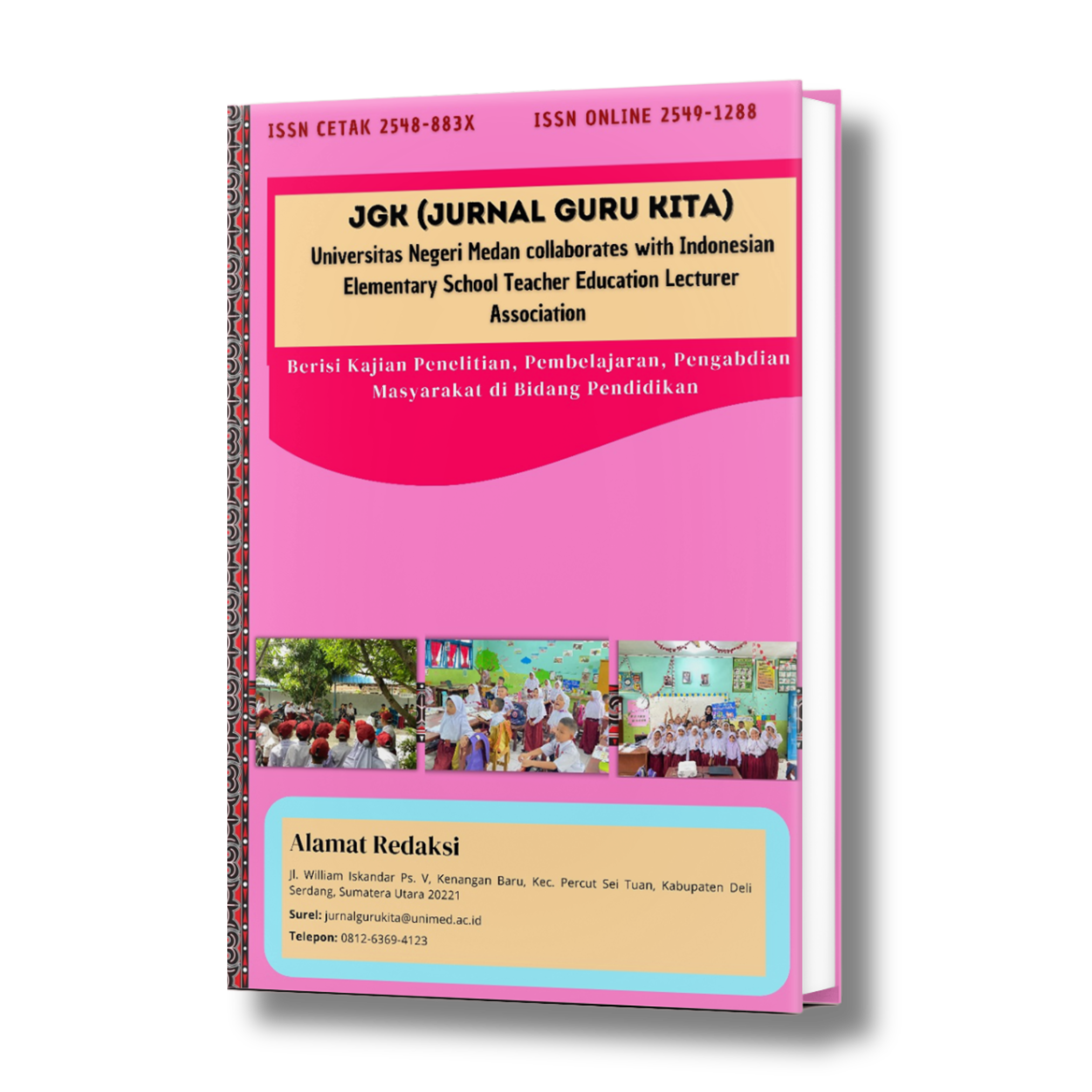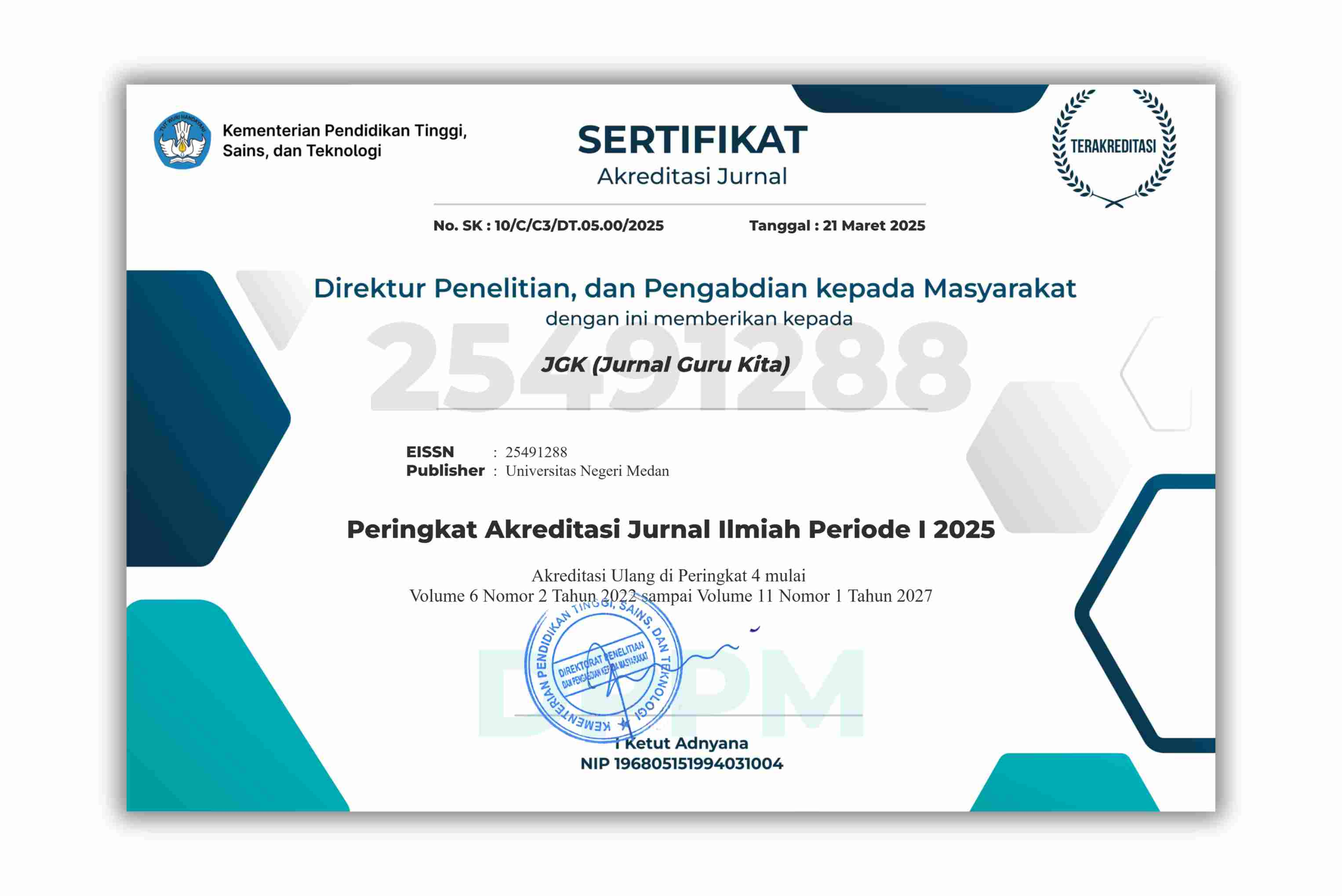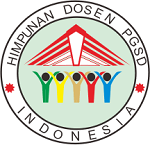Penerapan Filsafat Pendidikan Dalam Mengelola Beragam Tipe Guru di Lingkungan Sekolah
DOI:
https://doi.org/10.24114/jgk.v9i2.64295Keywords:
Filsafat, Guru, Pendidikan, SekolahAbstract
Tujuan dari penelitian ini yaitu untuk mengetahui ruang lingkup filsafat Pendidikan, untuk mengetahui beragam tipe guru, dan untuk mengetahui Penerapan Filsafat Pendidikan dalam Mengelola Beragam Tipe Guru di Lingkungan Sekolah. Penelitian ini adalah sebuah sistematik literatur review. Prosedur penelitian ini mangadopsi desain PRISMA (Preferred Items for Systematic Reviews and Meta-Analysis). Populasi penelitian ini terdiri dari jurnal. Sampel penelitian ini terdiri dari 14 jurnal. Prosedur untuk penelitian ini terdiri dari empat langkah utama yaitu identifikasi, skrining, kelayakan, dan disertakan. Berdasarkan hasil penelitian ini dapat disimpulkan bahwa Penerapan filsafat pendidikan dalam pengelolaan beragam tipe guru di sekolah memiliki peran penting dalam menciptakan lingkungan pendidikan yang inklusif, dinamis, dan efektif.References
Adler, M. J. (2022). The Paideia proposal: An educational manifesto (Anniversary ed.). Touchstone.
An-Nur. (2023). Filsafat Pendidikan: Pengertian, Ruang Lingkup, Aliran-Aliran, dan Hubungan Filsafat dalam Pendidikan.
Ansya, Y. A. (2023). Upaya Meningkatkan Minat dan Prestasi Belajar Siswa Kelas IV Sekolah Dasar pada Pembelajaran IPA Menggunakan Strategi PjBL (Project-Based Learning). Jurnal Ilmu Manajemen Dan Pendidikan (JIMPIAN), 3(1), 43–52. https://doi.org/10.30872/jimpian.v3i1.2225
Ansya, Y. A., Alfianita, A., & Syahkira, H. P. (2024). OPTIMIZING MATHEMATICS LEARNING IN FIFTH GRADES: THE CRITICAL ROLE OF EVALUATION IN IMPROVING STUDENT ACHIEVEMENT AND CHARACTER. PROGRES PENDIDIKAN, 5(3), 302–311. https://prospek.unram.ac.id/index.php/PROSPEK/article/view/1120
Ansya, Y. A., Alfianita, A., Syahkira, H. P., & Syahrial, S. (2024). Peran Evaluasi Pembelajaran pada Mata Pelajaran Matematika Kelas V Sekolah Dasar. Indiktika : Jurnal Inovasi Pendidikan Matematika, 6(2), 173–184. https://doi.org/10.31851/indiktika.v6i2.15030
Ansya, Y. A., & Salsabilla, T. (2024). Model Pembelajaran IPA di Sekolah Dasar. Cahya Ghani Recovery.
Aryana. (2021). Urgensi Pendidikan Karakter (Kajian Filsafat Pendidikan). Jurnal BELAINDIKA, 11(1), 1–10.
Counts, G. S. (2023). Dare the school build a new social order? (Revised edition). Teachers College Press.
Dewey, J., & Boydston, J. A. (2021). The middle works of John Dewey (Vol. 10). SIU Press.
Firmansyah, D., & Wahyuni, A. (2022). Signifikansi Filsafat Pendidikan dalam Pengelolaan Guru di Sekolah. Cendekia, 14(3), 359–365.
Gutek, G. L. (2023). Philosophical, ideological, and theoretical perspectives on education (3rd ed.). Pearson.
Hasmar, A. S., & Ismail. (2024). Filsafat pendidikan dan berbagai tipe guru. Cendikia : Media Jurnal Ilmiah Pendidikan, 14(3), 359–365.
Jabar, C. S., & Ismail. (2024). Makna Pembelajaran Melalui Berbagai Tipe Guru Dalam Perspektif Filsafat Pendidikan. Jurnal InovasiPendidikan, 7(1), 33–39.
Kurnia, S., Santi, A. N., Yenni, D. H., & Ayu, M. (2023). Pentingnya Penerapan Filsafat Pendidikan oleh Guru Sekolah Dasar. Scholaria: Jurnal Pendidikan Dan Kebudayaan, 12(3), 236–243.
Maslow, A. H. (2021). Toward a psychology of being (4th ed.). Wiley.
McLaren, P. (2021). Life in schools: An introduction to critical pedagogy in the foundations of education (7th ed.). Routledge.
Nurhayati, A., & Rahman, T. (2022). Implementasi pendekatan humanistik dalam meningkatkan kinerja guru di sekolah dasar. Jurnal Pendidikan Dasar Indonesia, 8(1), 45–52.
Rahmawati, L., & Yulianto, B. (2023). Analisis penerapan filsafat pendidikan dalam manajemen tipe guru di sekolah. Jurnal Manajemen Pendidikan, 10(1), 67–79.
Robinson, K., & Aronica, L. (2018). Creative schools: The grassroots revolution that’s transforming education. Penguin Books.
Rusli, S. M., & Zaim, M. (2022). Penerapan Filsafat Pendidikan dengan Inovasi Materi Pembelajaran Bahasa Indonesia. JUPE: Jurnal Pendidikan Mandala, 7(4).
Santrock, J. W. (2021). Educational psychology (15th ed.). McGraw-Hill.
Sari, Y., Ansya, Y. A., Alfianita, A., & Putri, P. A. (2023). STUDI LITERATUR : UPAYA DAN STRATEGI MENINGKATKAN MOTIVASI BELAJAR SISWA KELAS V SEKOLAH DASAR DALAM PEMBELAJARAN BAHASA DAN SASTRA INDONESIA. Jurnal Guru Kita PGSD, 8(1), 9–26. https://doi.org/10.24114/jgk.v8i1.53931
Setiawan, D., & Hidayat, L. (2020). Pengaruh filsafat progresivisme terhadap kreativitas guru di sekolah menengah. Jurnal Pendidikan Dan Kebudayaan, 25(3), 210–219.
Subagyo, H., & Kurniawati, E. (2023). Pengaruh filsafat esensialisme terhadap disiplin dan pengelolaan kelas oleh guru otoriter. Jurnal Pendidikan Indonesia, 14(2), 85–94.
Tough, P. (2019). Helping children succeed: What works and why. Houghton Mifflin Harcourt.
Umasugi, H. (2020). Guru sebagai motivator. JUANGA: Jurnal Agama Dan Ilmu Pengetahuan, 6(2).
Van Cleve, R. M., & Peterson, S. (2022). Existentialism and education: An exploration in teaching and learning. Routledge.
Wentzel, K. R., & Miele, D. B. (2023). Handbook of motivation at school (2nd ed.). Routledge.
Wibowo, S. (2021). Eksistensialisme dan pendidikan karakter di Indonesia: Kajian filosofis. Jurnal Filsafat Pendidikan, 5(2), 115–126.
Wiyanto, A. B., Susilo, C. D., & Putri, E. F. (2020). Pengaruh model pembelajaran inklusif terhadap motivasi belajar siswa. Jurnal Pendidikan Indonesia, 9(2), 123–145.
Woolfolk, A. (2022). Educational psychology (14th ed.). Pearson.
Downloads
Published
How to Cite
Issue
Section
License
Copyright (c) 2025 Ainun Mardia HM, Ismail Ismail

This work is licensed under a Creative Commons Attribution-ShareAlike 4.0 International License.
Authors published with the JGK (Jurnal Guru Kita) agree to the following terms:
- Authors retain copyright and grant the journal the right of first publication with the work simultaneously licensed under a Creative Commons Attribution License (CC BY-SA 4.0) that allows others to share the work with an acknowledgment of the work's authorship and initial publication in this journal.
- Authors are able to enter into separate, additional contractual arrangements for the non-exclusive distribution of the journal's published version of the work (e.g., post it to an institutional repository or publish it in a book), with an acknowledgment of its initial publication in this journal.
- Authors are permitted and encouraged to post their work online (e.g., in institutional repositories or on their website) prior to and during the submission process, as it can lead to productive exchanges, as well as earlier and greater citation of published work. (See The Effect of Open Access)

























